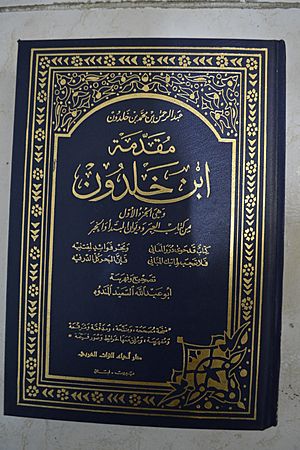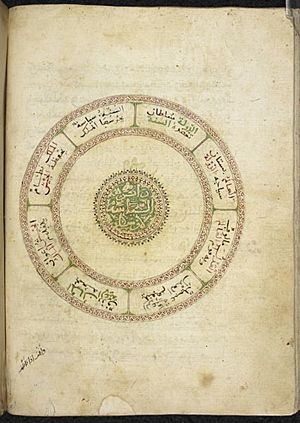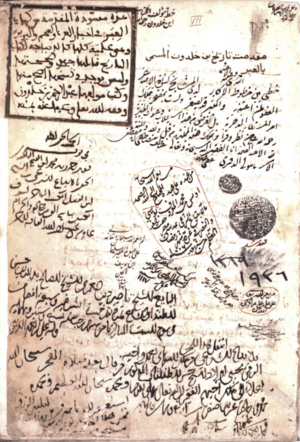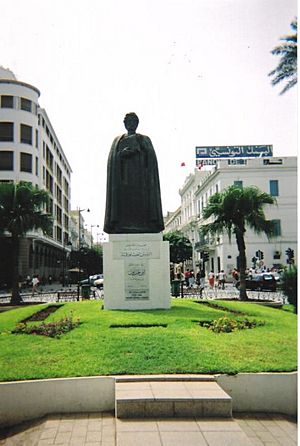Muqaddimah facts for kids
 |
|
| Author | Ibn Khaldun |
|---|---|
| Original title | مقدّمة ابن خلدون |
| Language | Arabic |
| Published | 1377 |
| Text | Muqaddimah at Wikisource |
The Muqaddimah (which means "Introduction" in Arabic) is a famous book. It was written by the Arab historian Ibn Khaldun in 1377. This book shares his ideas about world history.
Many people today see it as one of the first books about social sciences. These include sociology (the study of society), demography (the study of populations), and cultural history (the study of cultures). The Muqaddimah also talks about Islamic theology, how history is written, the philosophy of history, economics, and political ideas.
Ibn Khaldun wrote the Muqaddimah as the first part of his larger history book, the Kitab al-ʿIbar. But even during his lifetime, people saw the Muqaddimah as a very important book on its own.
Contents
What Does "Muqaddimah" Mean?
The word Muqaddimah (مُقَدِّمَة) comes from Arabic. It means "prologue" or "introduction." It is used to introduce a bigger piece of writing.
The Story of the Muqaddimah
Ibn Khaldun wrote the first version of the Muqaddimah in a place called Qalʿat ibn Salama. He stayed there for almost four years, away from political life. This book was the first part of a huge history project. He worked on it for nearly thirty years. His main work, the Kitab al-ʿIbar, was a massive world history. It filled seventeen volumes in its modern edition.
A first draft of the Muqaddimah was finished in 1377. Some copies of the Muqaddimah made during Ibn Khaldun's life still exist. Many of them have his own notes or additions written in the margins.
In the Muqaddimah, Ibn Khaldun introduced a "new science." He had kept this science a secret until he retired. This new science was for studying what he called "ʿumrān" (عُمران). This new field, ʿilm al-ʿumrān, aimed to study how humans and societies changed over time. It used a method that was historical, based on facts, logical, and provable.
For a few centuries after it was written, the Muqaddimah was not widely celebrated. However, it was mentioned by some writers in Morocco and Egypt. Later, Ottoman historians like Kâtip Çelebi and Mustafa Naima valued its ideas. They liked its social and political theories.
The Muqaddimah was first printed as a separate book in 1857 in Cairo. The first full translation into Ottoman Turkish was published in 1860/61.
Experts say that Ibn Khaldun's scientific ideas about history and social sciences were not fully recognized in the Muslim world until the late 1800s.
The Muqaddimah was first discovered in France through a partial Turkish translation. In 1858, a year after it was first printed in Cairo, the Arabic text was published in Paris. A French translation came out in 1863. The first English translation was published by Franz Rosenthal in 1958.
Understanding Society
What is ʿAsabiyyah?

One of the most famous ideas in the Muqaddimah is "ʿasabiyyah." This Arabic word can mean "group feeling," "social togetherness," or "solidarity." It's like the strong bond that holds a group of people together.
Ibn Khaldun believed that when this group feeling gets weaker, another stronger group feeling can take its place. This is how civilizations rise and fall. History, he said, shows these cycles of ʿasabiyyah playing out.
He argued that every ruling family or dynasty carries the seeds of its own end. New rulers often come from the edges of big empires. They use their strong group feeling to take over leadership. But once these new rulers settle in the center of their empire, they become too comfortable. They care more about their luxurious lifestyles. This makes them weaker. Then, a new group with a strong ʿasabiyyah can rise up from the edges and take control. This starts the cycle all over again.
How Economics Works
Ibn Khaldun wrote about economic and political ideas in the Muqaddimah. He linked his idea of ʿasabiyyah to how people work together. He believed that the stronger the social togetherness, the more complex jobs people can do. This leads to more economic growth.
He explained that when a city's population grows, more people are available to work. This leads to more luxury goods and services. New crafts are created to make these luxury items. The value of these items increases, and so do profits in the city. Production booms even more. This cycle continues, with more and more work going towards luxury and wealth.
Ibn Khaldun also noticed that growth and development help both supply and demand. He understood that supply and demand are what set the prices of goods. He also saw how population growth, skilled workers, and new technologies affect development. He believed that population growth was linked to how wealthy a place was.
He knew that money acts as a way to measure value, a way to exchange goods, and a way to save value. He also introduced the labor theory of value. This idea says that work is the source of value. All earnings and wealth come from labor. He argued that even if you earn money from something other than a craft, the value of that earning must include the value of the work put into it. Without work, it wouldn't have been gained.
Ibn Khaldun described how prices are set. He understood that when a good is hard to find and many people want it, its price is high. But when there's a lot of a good, its price is low.
The people in a city have more food than they need. So, the price of food is usually low. This is unless bad things happen, like weather problems that affect the food supply.
Taxes and the Laffer Curve
Ibn Khaldun also talked about an idea now known as the Laffer curve. This idea suggests that if taxes are increased, the government's income from taxes will go up at first. But if taxes become too high, people will be discouraged from working and producing. This will cause tax revenues to actually go down.
He used a logical way to explain how taxes affect society:
At the start of a ruling family's time, taxes are light, but they bring in a lot of money... As time passes and new rulers take over, they lose their simple habits. They become more luxurious. Their needs and demands grow... because of the luxury they grew up with. So, they put new taxes on their people... and sharply raise the old taxes to get more money... But these higher taxes hurt businesses. Business people quickly get discouraged when they compare their profits to their heavy taxes... As a result, production drops, and with it, the amount of tax collected.
This idea is very similar to the modern Laffer curve.
Writing History
The Muqaddimah is also seen as a very important book for the study of historiography (how history is written). It also helped shape cultural history and the philosophy of history. The book also looked at how governments, communication, and even systematic bias (unfairness) play a role in history.
Franz Rosenthal, a historian, wrote that Muslim historians made big steps forward. They understood history in a social way and organized how history was written. He believed that Muslim historical writings helped Western historians see the world differently from the 1600s onwards.
How to Study History
The Muqaddimah says that history is a philosophical science. Historians should try to prove myths wrong. Ibn Khaldun looked at the past as something strange that needed to be understood. He was original because he said that to understand historical information, you must consider the culture of that time. He also felt that experience, not just logic, was needed to truly understand a past culture. Ibn Khaldun often criticized "lazy superstition and simply believing historical facts without checking." Because of this, he brought a scientific method to the study of history. This was seen as something "new for his time." He often called it his "new science."
The Philosophy of History
Ibn Khaldun is considered a pioneer of the philosophy of history. This means he was one of the first to think deeply about the meaning and purpose of history. N. J. Dawood wrote that the Muqaddimah can be seen as the first attempt by any historian to find a pattern in how human societies and governments change. It was logical, analytical, and detailed. It broke away from traditional history writing. It looked beyond just listing events to find an explanation and a philosophy of history.
Understanding Bias
The Muqaddimah also highlighted how systemic bias can affect how history is recorded. Ibn Khaldun was concerned that people might be very strict about checking facts for claims they didn't like. But they might be too relaxed when checking claims that seemed reasonable or comfortable to them. He also looked at why historians often make historical events sound more exciting. They might also exaggerate numbers.
When people talk about armies or tax money from their own time, they often exaggerate. They go beyond what is normal and try to make things sound more exciting. But if you check with officials, the real numbers are often only a tenth of what people said. The reason is simple. It's the common wish for excitement, how easy it is to just say a higher number, and that people don't really check or criticize.
Islamic Beliefs
The Muqaddimah talks about Islamic theology. It shows that Ibn Khaldun followed the traditional Ash'ari school of Sunni Islam. He also supported the religious views of al-Ghazali. He criticized some ideas from Neoplatonism, especially the idea of a hierarchy of being.
The book also covers how kalam (Islamic philosophy) and different Islamic schools of thought developed. Ibn Khaldun, being an Ash'ari follower, criticized the Mu'tazili school. He based his criticisms on the ideas of Abu al-Hasan al-Ash'ari. Ibn Khaldun also discussed the history of Islamic logic in relation to theology. He believed logic should be separate from early Islamic philosophy. The book also explains verses from the Qur'an.
Sharia and Fiqh
Ibn Khaldun was an Islamic jurist (a scholar of Islamic law). He discussed sharia (Islamic law) and fiqh (Islamic jurisprudence) in his Muqaddimah. He wrote that "Jurisprudence is knowing how God's laws are classified." He understood that everything in a community changes over time.
The conditions, customs, and beliefs of people and nations do not stay the same forever. Instead, they change with days and times, and move from one state to another... this is God's law for His people.
He further described Fiqh as "knowing God's rules about what people must do, what is forbidden, what is recommended, what is disliked, or what is simply allowed."
Natural Sciences
Ideas on Biology
Some of Ibn Khaldun's ideas seem to hint at the biological theory of evolution. Ibn Khaldun suggested that humans developed from "the world of the monkeys." He described a process where "species become more numerous." He wrote in Chapter 1 of the Muqaddimah:
One should then look at the world of creation. It began with minerals and moved, in a clever, step-by-step way, to plants and animals. The last stage of minerals is connected to the first stage of plants, like herbs. The last stage of plants, like palms, is connected to the first stage of animals, like snails which only have the sense of touch. 'Connection' here means that the last stage of each group is ready to become the first stage of the next group.
The animal world then grows, its species become many. In a gradual process of creation, it finally leads to humans, who can think and reflect. The higher stage of humans is reached from the world of monkeys. Monkeys have cleverness and understanding, but they haven't reached true reflection and thinking. At this point, we come to the first stage of humans. This is as far as we can see with our eyes.
Ibn Khaldun believed that humans are the most developed form of animals because they can reason. The Muqaddimah also says in Chapter 6:
We explained that all of existence, in all its simple and complex worlds, is arranged in a natural order of going up and down. So everything forms a continuous line. The main parts at the end of each stage are naturally ready to change into the main part next to them, either above or below. This is true for simple materials; it's true for palms and vines (the last stage of plants) in their connection to snails (the lowest stage of animals). It's also true for monkeys, creatures that combine cleverness and understanding, in their connection to humans, who can think and reflect. This readiness to change, at each stage, is what we mean by their connection.
His ideas about evolution seem similar to those found in the Encyclopedia of the Brethren of Purity. Ibn Khaldun also believed in environmental determinism. This means he thought that things like the black skin, customs, and practices of people in sub-Saharan Africa were due to the hot climate of that region.
Some scholars, like Shoaib Ahmed Malik, argue that Ibn Khaldun's theory should be understood in the context of the medieval idea of the great chain of being. This idea suggests a linked order between all things in creation, from minerals to plants, animals, humans, angels, and God. However, it doesn't mean one species changes into another over time. Instead, it implies a graded similarity between different stages.
Alchemy
Ibn Khaldun was critical of alchemy, which was an old practice of trying to turn common metals into gold. The Muqaddimah talks about the history of alchemy and the ideas of alchemists. It also discusses theories about changing metals and the elixir of life. One part of the book strongly argues against alchemy using social, scientific, philosophical, and religious reasons.
He argued that many alchemists couldn't make a living and ended up "losing their trust because their attempts were useless." He also said that if changing metals into gold and silver were possible, it would make money useless. This would go against divine wisdom. He believed that some alchemists cheated by putting a thin layer of gold on silver jewelry.
Ibn Khaldun stated that most alchemists were honest and believed that changing metals was possible. But he argued that it was an unlikely theory because no one had ever successfully done it. He concluded that "Alchemy can only be achieved through psychic influences. Extraordinary things are either miracles or witchcraft... They are limitless; no one can claim to get them."
Political Ideas
In the introduction of the Muqaddimah, Ibn Khaldun agreed with the idea that humans are naturally political. He believed that people need each other, which creates the need for a political community. But he also argued that people and tribes need to protect themselves from attacks. This is why political communities are formed. The strong bond that holds tribes together and eventually forms a "royal authority" or state, according to Ibn Khaldun, is ʿasabiyyah.
He argued that the best type of political community is a caliphate, or an Islamic state. He believed that the ideas of a "perfect state" from other philosophers were not useful. This is because God's Law, the sharia, was revealed to care for public interest and the afterlife.
The second best state, Ibn Khaldun argued, is one based on justice and caring for public well-being in this life. But it's not based on religious law, so it doesn't help with the afterlife. Ibn Khaldun called this state blameworthy. The worst type of state, he said, is a tyranny. In a tyranny, the government takes people's property and rules unfairly against their rights. He argued that if a ruler cannot be both loved and feared, it is better to be loved. This is because fear creates many bad effects among the people.
Ibn Khaldun wrote that civilizations have lifespans, just like people. He believed that every state will eventually fall. This happens because luxurious living distracts them. Also, governments start to overtax citizens and act unfairly against property rights. He said that "injustice ruins civilization." Eventually, when one ruling family or government falls, another replaces it. This creates a continuous cycle.
The British philosopher Ernest Gellner thought Ibn Khaldun's definition of government was the best in the history of political philosophy. Ibn Khaldun defined government as "an institution which prevents injustice other than such as it commits itself."
See also
 In Spanish: Muqaddima para niños
In Spanish: Muqaddima para niños
 | John T. Biggers |
 | Thomas Blackshear |
 | Mark Bradford |
 | Beverly Buchanan |



